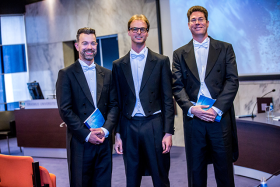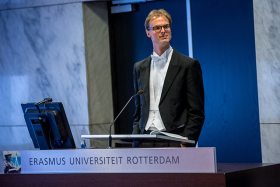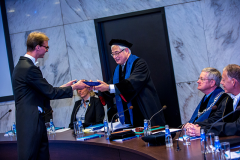PhD Defence: The Influence of Cultural Distance on Competence Development in Educational Travel
 Students travelling to low income or socialist countries for internships gain fewer management competencies than students who travel to other parts of the world. In his PhD dissertation entitled ‘Travel to Learn: The Influence of Cultural Distance on Competence Development in Educational Travel’, Erik van ‘t Klooster reveals that going abroad makes you more employable. But this is not universally beneficial; relative youth, ‘staying in’ instead of exploring or too short a time abroad can also reduce the benefits.
Students travelling to low income or socialist countries for internships gain fewer management competencies than students who travel to other parts of the world. In his PhD dissertation entitled ‘Travel to Learn: The Influence of Cultural Distance on Competence Development in Educational Travel’, Erik van ‘t Klooster reveals that going abroad makes you more employable. But this is not universally beneficial; relative youth, ‘staying in’ instead of exploring or too short a time abroad can also reduce the benefits.
Increasing numbers of students have travelled abroad for their studies, internships and short-term programmes over the past 20 years. Consequently, companies now look for international work experience instead of just international study. Erik van ‘t Klooster surveyed more than 1,000 students, interns and alumni from around the world to find out what they get from educational travel. His study Travel to Learn: The Influence of Cultural Distance on Competence Development in Educational Travel shows that students who travel abroad gain management competencies and often also improve their cross-cultural competencies, especially those who worked in multicultural teams. They also become more independent, flexible and self-aware.
Remarkably, international studies are not universally beneficial. Students travelling to low income regions or countries with predominantly socialist governments benefit a lot less from their travels. It is more difficult for these students to appreciate the host culture and interact with locals, especially in countries in Asia, Africa or parts of Southern Europe and South America. This group of students also learned fewer technical, intra- and interpersonal management skills. Subsequently, these students needed to put more effort into developing cross-cultural competencies.

Different types of educational travel give different effects and as such it becomes important for students to think carefully about what competencies they want to achieve. For example, taking part in international research projects will significantly improve management competencies, but provides fewer cross-cultural competencies and less personal development than becoming a student or an intern abroad.
Learning is sometimes hampered by spending too little time abroad, or staying in an expat bubble, or poor quality of employment. Also, the young age of students can lead to a lack of realistic judgment, in particular related to developing cross-cultural competencies.
Properly reflecting on the experience is a good way to get the most out of travelling, to fully understand the experience and the competencies it delivers, not just for management competencies, cross-cultural abilities and personal development. Proper reflection also means a better understanding of concepts that students thought were disconnected before they went abroad such as the cultural values and social class systems that affect daily business practices and international business opportunities.
Erik defended his dissertation in the Senate Hall at Erasmus University Rotterdam on Friday 6 June 2014. His supervisor was Frank Go, Professor Emeritus of the department of Marketing Management, Erasmus University, and his co-supervisor was Peter van Baalen, professor of Information Management and Digital Organisation, UvA. Other members of the Doctoral Committee were Prof. dr. Alexander Maas, Prof.dr. Slawek Magala and Prof. dr. Lucas Meijs.
About Erik van ‘t Klooster
 For the past ten years, besides doing research for his dissertation on competence development in educational travel, Erik van ‘t Klooster (1979) has been working freelance under the alias of ‘Get up & Go’ in the field of marketing, international research and event & tourism management. His clients include different educational institutes such as the Rotterdam School of Management, Erasmus University and Hotel School the Hague as well as the student associations AIESEC International and MAEUR. In 2009 he co-founded Placebrandz.com and has consulted, for example, on the place branding strategy for the Maastricht region and the cluster brand strategy for the polymer sector in the province of Overijssel, the Netherlands. Other professional work experiences include working as a performance data analyst for Shell Asset Management Company (SAMCo) and being the project manager for several business and leisure events. In his free time Erik enjoys playing squash, swimming and has an eclectic taste in music, movies, reading and travel. For more information see: www.getupandgo.nl.
For the past ten years, besides doing research for his dissertation on competence development in educational travel, Erik van ‘t Klooster (1979) has been working freelance under the alias of ‘Get up & Go’ in the field of marketing, international research and event & tourism management. His clients include different educational institutes such as the Rotterdam School of Management, Erasmus University and Hotel School the Hague as well as the student associations AIESEC International and MAEUR. In 2009 he co-founded Placebrandz.com and has consulted, for example, on the place branding strategy for the Maastricht region and the cluster brand strategy for the polymer sector in the province of Overijssel, the Netherlands. Other professional work experiences include working as a performance data analyst for Shell Asset Management Company (SAMCo) and being the project manager for several business and leisure events. In his free time Erik enjoys playing squash, swimming and has an eclectic taste in music, movies, reading and travel. For more information see: www.getupandgo.nl.
Abstract of Travel to Learn: The Influence of Cultural Distance on Competence Development in Educational Travel
Innovations in transport and information communication technology have led to an ever expanding global perspective and playing field, for both business and citizens. Educational institutes play an important role in preparing students for this new reality. One way of doing this is for students to engage in educational travel experiences. Indeed, over the past two decades increasing numbers of students participated in study abroad programmes, study tours, international internships and relatively new short-term programmes such as international research projects. Yet, at the same time, globalisation seems to have reduced some of the traditional benefits of educational travel, as the challenge of adapting to a different cultural environment has become easier than it has been in the past. Equally, there is a need to reconsider the competencies that educational travel should develop, as there is a noticeable shift towards pointing out the professional relevance of these experiences. The aim of this research is to work towards a competence framework and investigate how the learning of competencies is related to overcoming cultural distance. Based on these findings, implications for learning programmes are formulated.
- <link doctoral-programme phd-in-management phd-projects detail>Download Erik's dissertation
- View photos of his defence
Photos: Chris Gorzeman / Capital Images


